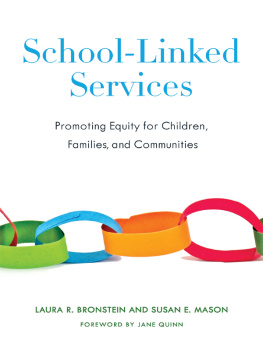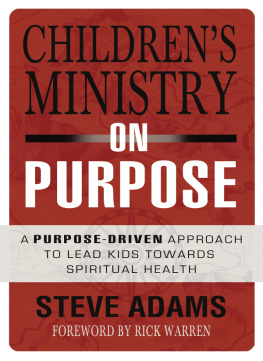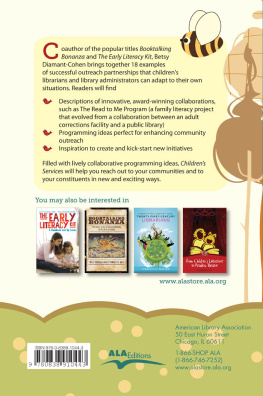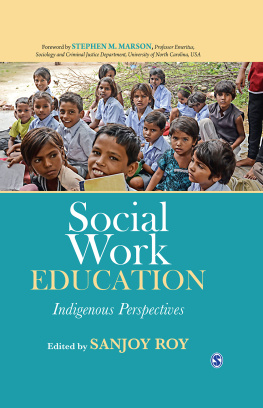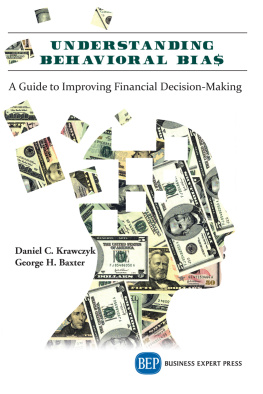Social Work
in Education
and Childrens
Services
Transforming Social Work Practice titles in the series
To order, please contact our distributor: BEBC Distribution, Albion Close, Parkstone, Poole, BH12 3LL. Telephone: 0845 230 9000, email: learningmatters@bebc.co.uk. You can also find more information on each of these titles and our other learning resources at www.learningmatters.co.uk.
First published in 2006 by Learning Matters Ltd.
Reprinted in 2007
All rights reserved. No part of this publication may be reproduced, stored in a retrieval system, or transmitted in any form by any means, electronic, mechanical, photocopying, recording, or otherwise, without prior permission in writing from Learning Matters.
2006 Nigel Horner and Steve Krawczyk
British Library Cataloguing in Publication Data
A CIP record for this book is available from the British Library.
ISBN: 978 1 84445 045 9
The rights of Nigel Horner and Steve Krawcyzk to be identified as the Authors of this Work has been asserted by them in accordance with the Copyright, Designs and Patents Act 1988.
Cover and text design by Code 5 Design Associates Ltd
Project management by Deer Park Productions
Typeset by Pantek Arts Ltd, Maidstone, Kent
Printed and bound in Great Britain by Bell & Bain Ltd, Glasgow
Learning Matters Ltd
33 Southernhay East
Exeter EX1 1NX
Tel: 01392 215560
info@learningmatters.co.uk
www.learningmatters.co.uk
Dedications
From Nigel: For my mother, Biddy Horner, who has demonstrated such resilience and adaptability at any age!
From Steve: For Maree, John and Paul, who ask for so little, yet deserve so much more.
Acknowledgements
The authors would like to express their appreciation to members of the East Midlands Education Welfare Consortium, and to Tony Stevens and Linda Kelly for providing case examples.
We wish to express our particular appreciation to George Gilmore, Head Teacher of Applefields School in the City of York, for invaluable advice and information regarding children with additional needs.
Introduction
What a wise parent would desire for his (sic) own children, so a nation, in so far as it is wise, must desire for all children.
(R.H. Tawney, 1931, p146, quoting the Board of Education, 1931, pxxix)
ACHIEVING A SOCIAL WORK DEGREE
This chapter will help you the meet the following National Occupational Standards (TOPSS, 2002):
Key Role 1: Prepare for and work with individuals, families, carers, groups and communities to assess their needs and circumstances:
- Prepare for social work contact and involvement.
Key Role 5: Manage and be accountable, with supervision and support, for your own social work practice within your organisation.
- Work within multi-disciplinary and multi-organisational teams, networks and systems.
Key Role 6: Demonstrate professional competence in social work practice:
- Research, analyse, evaluate and use current knowledge of best social work practice.
- Contribute to the promotion of best social work practice.
It will also introduce you to the following academic standards as set out in the social work subject benchmark statement (Quality Assurance Agency for Higher Education (QAA), 2000):
2.2.1 Defining principles
Social work is located within different social welfare contexts. Within the UK there are different traditions of social welfare (influenced by legislation, historical development and social attitudes) and these have shaped both social work education and practice in community-based settings including group care.
2.2.2 Defining principles
There are competing views in society at large on the nature of social work and its place and purpose. Social work practice and education inevitably reflect these differing perspectives on the role of social work in relation to social justice, social care and social order.
3.1.2 The service delivery context
The significance of inter-relationships with other social services, especially education, housing, health, income maintenance and criminal justice.
3.1.5 The nature of social work practice
The factors and processes that facilitate effective inter-disciplinary, inter-professional and inter-agency collaboration and partnership.
Setting the scene: Children, young people, families and education
In 2003 there were 11.7 million children under the age of 16 in the UK (SocietyGuardian, 2005) which represents a relatively consistent figure over the past 30 years, although we are now in a period of actual decline, and the total is projected to fall to 11.1 million by 2011. As life expectancy continues to rise, then the proportion of the population defined as children or young people will decrease to the point where it is estimated that by 2013, the number of people over 65 will, for the first time ever, exceed those aged under 16. This amounts to a seismic shift in the nations demography, and will have significant implications in terms of the importance of education and training as the base camp from which children and young people will navigate their lengthening working lives in pursuit of an ever more elusive and unpredictable goal of financial security in old age.
However, this book is not about adult working life now called the Second Age nor the expanding and lengthening post-working period of life the Third Age but it is about a core part of the beginning of the life course, namely the activities and experiences in the First Age, in childhood and adolescence. It is about education and schooling, and its importance and meaning for children, young people and their families and carers.
For the majority of children and young people, schooling amounts to a mixed blessing of encouragements and disappointments, of challenges and successes, of friendships made and sustained or made and lost, of teachers liked and admired or disliked and feared, of lasting memories which are, for the majority, mostly positive. That said, for a small but significant number of children and young people, school amounts to little less than a place of oppression, violence, fear, failure, rejection, exclusion and despair. Indeed, for yet another sub-group, schooling is primarily something to be avoided altogether. For particularly vulnerable groups, such as disabled children or those looked after by the local authority, good schooling can play a particularly significant role in assisting and promoting their resilience and in developing their potential, whilst poor schooling can set them back significantly. Sonia Jackson, who since the 1980s has studied the educational outcomes for children and young people in public care, affirms that:





